- Home
- Jeff Mariotte
The Burning Season Page 3
The Burning Season Read online
Page 3
“Yes, of course.”
“Garrett, same thing for his office.”
“You got it, Jim.”
“Do you have any other ideas, Mrs. Daniels? Anyone you know of who has it in for your husband?”
“I wouldn’t have any idea. I was able to talk to Dennis, while they were putting him in the ambulance. He was conscious, so I asked him if he knew who would do such a thing. He said he didn’t.”
“It’s a terrible thing, for both of you, your families, and the other victims. Rest assured, we’ll do everything we can to find the bomber, and fast.”
“And you’ll keep us posted on your progress?” Brett asked.
“To the extent that’s reasonable. Our main consideration has to be what’s best for the investigation, as I’m sure you understand. When it’s practical to be in touch with you, without diverting resources from that effort, then of course we’ll do so.”
“That’s the best we could hope for,” Joanna said. “Thank you for your effort, Captain Brass.”
“You can thank me,” Brass said, “after we catch him.”
4
GREG HAD ALWAYS liked working with Sara. In earlier days, he’d had an unabashed crush on her. That had faded as he got to know her better—not that he thought any less of her, but their friendship had deepened and matured in a different direction. He had been happy for her when she married Gil Grissom. He was also glad she had returned to Las Vegas to work with her comrades at the crime lab while Grissom taught in Paris.
She was on her hands and knees, wearing coveralls, booties and a surgical mask, marking the location of every object she found that might conceivably have some bearing on the case. Greg wore a similar outfit, but he was still involved with the preliminary task of photographing the overall scene: the street, place where the bomb had cratered street and buckled sidewalk, the SUVs joined together by the force of impact. He had already made a couple of preliminary sketches; his photos would fill in the details.
When he finished shooting the broader scene, he moved in closer on the items Sara was marking. Among the usual urban detritus were things that seemed more pertinent to their specific task—bits of twisted aluminum, short lengths of copper wire, a chunk of sharp-edged plastic. These might have been bomb components, and Greg moved in close with the digital camera, making sure to compose the shots with Sara’s numbered cards in them, so they would fit into the overall picture he was creating of the scene. They also helped represent the scale of the objects.
“Whoa, Greg, careful,” Sara said. He moved the camera away from his face and saw that he had almost stepped on her hand, as she placed a numbered card next to a scrap of shredded fabric.
“Sorry.”
“You’re shooting digital, right?”
“Yes.”
“So I guess that whole issue with the admissibility of digital photos got resolved while I was away?”
“For the most part, yeah. It’s still on a state-by-state basis, but most courts will allow them. There might have to be testimony stating that they accurately reflect conditions at the scene, but there’s plenty of metadata associated with a digital photo that can show it hasn’t been tampered with.”
“And photographs on film can be retouched, as well,” Sara said. “Makes sense to me.”
“Especially on a scene like this, when we’re under the gun to release it in a hurry so traffic can flow.”
Sara had moved on to a chunk of rubber, probably from one of the vehicle tires. “It’s a real quandary for them, isn’t it?” She shifted her gaze to the command posts. “They want the street opened now, but they also want us to do our best work.”
“Can’t have both.”
“And it bugs me that there’s so much pressure on us to do everything right, when the victim is rich or politically connected. Like we don’t always do our best, no matter who’s involved.”
Greg scribbled a note in his photography log, then tucked the notebook into his pocket and went to one knee to shoot the fabric scrap Sara had just marked. Every exposure had to be documented for later. “I guess that’s why we do what we do, and they don’t. In the media game you have to be concerned about how things look. We have to stay above all that.”
“Above it, or under its boot heel,” Sara said. “Hard to be sure which.”
“There’s no such thing as doing too good a job,” Catherine said, joining them. “Or having too much documentary evidence. Keep that camera busy.”
“I’m getting it all,” Greg assured her.
“Good. Don’t worry about the politics of this, either of you. Brass has our backs on this one. We’ll have all the time we need.”
“That’s good to hear,” Sara said.
Catherine pointed to the chunk of plastic. “Have you photographed this, Greg?”
“Yep.”
She squatted beside it, picked it up, and turned it over in her gloved fingers. “Looks like it might be part of an electronic component. There’s a tiny bit of a threaded hole here, where a screw fit in.”
“Part of the bomb?” Greg asked. “That’s what I thought when I saw it.”
“Could be.”
“Let me take a look,” Earl said. He had been on hands and knees, picking up bits of detritus with tweezers and turning them this way and that, but when he’d heard the word bomb, his response was instantaneous. He gave a loud grunt as he heaved his considerable bulk to an upright position. He was wearing a blue Oxford shirt with his usual bow tie, this one adorned with multicolored polka dots. The tight curls of his once coppery hair had mostly gone silver, creating the impression that the wires that he dealt with in his professional life had somehow affected his physical appearance. “I think you’re right, Cath,” he said when he examined the object. “Most likely part of the detonator.”
“You think it was detonated remotely?” Greg asked.
“Looks like an IED, an improvised explosive device. They’re not everyday things here in Las Vegas, but in Iraq and Afghanistan they’re the biggest threat coalition forces encounter. They use various methods to defeat them—jammers that block the detonating radio signals, heat sources on long poles to set off those that are heat sensitive before vehicles reach them, that sort of thing. But even with all that effort and technology, they’re still damn destructive.”
Jim Brass ambled up to the group, hands in his pockets. “Does this look like the same sort of thing to you, Earl?”
“I haven’t found much of it yet, but at a glance, yeah.”
Catherine took the bit of plastic from Earl and set it back down, being careful, Greg noted, to place it in exactly the same way it had been when she picked it up, even though it had already been recorded. “What are you saying, Jim, you think this is terrorism?”
“It’s almost certainly terrorism, in the sense that terrorism is the use of violence to achieve a political end. I’m not saying I think it’s foreign terrorism, though. It could just as easily be a veteran, back from one of those combat zones, who learned about IEDs there.”
“I don’t like to think about vets doing something like that,” Greg said.
“I don’t either. But at this point, our job is to consider every possibility. That’s all I’m saying. There are veterans involved in those protests outside the DCN building. They’re protesting Daniels’s support for a funding bill they say will raise taxes. It’s not the kind of issue that’s likely to antagonize fundamentalist Islamic jihadists, but it riles a certain segment of our own population.”
“I agree,” Catherine said.
“You think those demonstrators are involved?” Earl asked.
Catherine was engrossed in studying what looked like a curved section of aluminum pipe. “Let’s just say that given some of the things they were saying, I was afraid the situation might escalate.”
“Like those signs showing Daniels in a hangman’s noose?” Brass asked. “You think that’s a giveaway?”
“I think it’s not my job to guess,”
Catherine said.
“Fair enough.”
Greg moved the camera away from his eyes. A uniformed cop had wandered over toward where they were working, and he was afraid the man might step on something important. They were taught not to, but in the moment they often forgot. “Excuse me, officer,” Greg said. “You need to keep out of this area for now.”
Brass turned to the new arrival, a pudgy man with a ruddy face and short coppery hair. His shirt-tails seemed to resist any attempt to keep them tucked, and he had a rumpled look about him that suggested it was his usual state. “Greg’s right, Benny,” Brass said. “Go keep those reporters on the far side of the yellow tape.”
“Right, captain,” Benny said. He halted in his tracks, turned, and wandered away.
When the cop was gone, Catherine faced her coworkers, chagrin evident on her face. “Do you think he heard us?”
“I wouldn’t worry too much about it,” Brass assured her. “Benny’s not the world’s greatest cop, but he’s okay.”
“I just don’t like to be caught speculating about a crime. My job is to find the facts, not guess about them.”
“I know that. Don’t worry, Cath.”
Catherine took Brass’s advice, and tried not to worry. By the time she got a call from Undersheriff Conrad Ecklie, ordering her back to the lab, she had mostly forgotten the incident. Conrad was sketchy about why he wanted her, though, and that drew her concerns back to the surface. Nick and Ray had arrived and were pitching in at the scene, so she left the effort under Nick’s command. Driving over, she tried to run through the conversation with Ecklie in her mind, hoping to anticipate his questions so she could provide the right answers. In the long run, though, she knew she had made a mistake, and whatever punishment was handed out to her, she would have to accept.
To her surprise, Ecklie didn’t mention her comment. When she walked into his office, expecting a dressing down, he met her with a big smile and an expansive gesture, indicating another man in the room. She didn’t recognize the visitor; he was a Latino with salt-and-pepper hair, a trim mustache, and a solid build. His suit and shoes probably cost as much as a small car.
“Catherine, this is Juan Castillo, from the Nevada AG’s office. Juan, this is Catherine Willows, night shift supervisor at the Las Vegas Crime Lab.”
Castillo rose from his chair and offered his hand. Catherine took it, and he gave her a firm, steady handshake. “It’s an honor to meet you, Ms. Willows,” he said.
“Thanks, I guess.” She was taken aback. “It’s a little late at night for the attorney general’s office, isn’t it? I thought you guys kept daytime hours.”
“We work around the clock, just as you do,” Castillo said. “And when Undersheriff Ecklie told me about your people, I knew I had to adjust my schedule to fit yours.”
This was not at all what she’d been expecting, and so far her confusion hadn’t been cleared up. “Conrad, can I ask what this is about?”
Ecklie sat behind his desk, templing his fingers. “Juan can fill you in.”
“This is about a homicide investigation,” Castillo said.
“That’s kind of what we do.”
“I’m aware of that, certainly. This particular one is a bit outside the norm, even for you, I’m afraid.”
“In what way?”
“You might have heard about the fire on Mt. Charleston,” Castillo said.
“A little. It’s been all over the news for a couple of days.”
“Yes. It’s a big fire, a terrible tragedy. Seventeen homes have been lost so far, and more are in immediate peril. By the time it’s controlled, property damage will be well into the millions. Double digits, I’m sure. That, however, is not the worst of it.”
“You did mention homicide.”
“Indeed. I’m afraid six firefighters perished when the wind shifted suddenly, surrounding them and their engine.”
“So they were killed by the fire.”
He handed her a manila folder. What she saw inside shocked her, and she wasn’t easily shocked anymore. The folder contained photographs of the dead firefighters: their protective clothing scorched, several of their bodies curled in the pugilistic position, the boxer’s pose, hands in front of their faces as if defensively, backs bent forward almost double, flesh blackened and blistered. The photos were awful, and she closed the file again after a quick study. “This tells me that they were burned, but not that they were alive before the fire. I’d have to know more.”
“Of course we’ll have full autopsies performed,” Castillo said. “But the team was in radio contact until shortly before the incident. We have no reason to doubt that the fire was the cause of deaths. But the manner of death is what we’re talking about here.”
Distinguishing between cause and manner began to clue Catherine in. The mechanism of death involved what physiological changes in the body led a person from the state of being alive to the state of being dead. The cause of death was what the immediate precipitator of those changes was, in this case, the fire. But the manner of death took a longer view, involving why the fire started. “You think it was arson?”
“Our investigation is ongoing, obviously. The fire is only forty percent contained, at this point. But yes, the Forest Service’s initial investigation points to the fire having been intentionally set.”
“The Forest Service is involved. So it’s a federal case?”
“Much of the fire has burned public lands. The place we believe the fire started, though, is on state land. Nevada wants to prosecute this case to the fullest extent of the law.”
“Meaning what, exactly?”
“Meaning the attorney general wants to find out who started the fire, and to charge that individual with the homicides of the six firefighters. And I want to make sure the case is airtight, because making that case is going to involve a tough courtroom fight.”
“No doubt. Has that been done before?”
“Several states are prosecuting these cases more rigorously than they used to, Catherine,” Ecklie said.
“Undersheriff Ecklie is correct,” Castillo added. “A California man was sentenced to death for starting a fire that killed firefighters. He’s still appealing the sentence, but a judgment like that sends a clear signal that arson will not be tolerated. In the past, people who have set wildland fires have walked away with minor sentences, three years, seven years—even when those fires burned hundreds of thousands of acres, destroyed dozens or hundreds of homes, and even killed. We want people to understand the severity of this crime. It’s not a small thing, starting a fire like that. And when people die, the person who set the fire should be punished accordingly.”
“What Juan wants—what the attorney general has asked for, to be more precise,” Ecklie said, “is for the best criminalists in the state to work this crime scene. The state has its own people, but they don’t have a lot of experience with this sort of arson investigation. Your people, at least, have dealt with a forest fire scene before.”
“That was a little different,” Catherine said. “That was a case in which a killer tried to use an existing fire to hide a homicide.”
“Nonetheless, your investigation involved studying the fire itself,” Castillo said. “We have people, the Forest Service has people. But the LVPD has the best people, the best lab, and we want the best on this one.”
“When do you want us to get started? We’re kind of in the middle of something now.”
“I told him about the Daniels incident,” Ecklie said.
“I understand that your resources are limited,” Castillo said. “By tomorrow afternoon we hope to have the fire fully contained. At that time, it should be safe for your people to go into the area where we believe the fire started. I’d prefer not to waste any more time than we have to.”
Her team had been working most of a shift already, and the Daniels scene was far from finished. Mt. Charleston was only twenty minutes from the city limits, but investigating a forest fire was going to be
another big, complicated job.
Ecklie and Castillo pinned her with their gazes, expecting a response. “Okay,” she said. “I’ll have a couple of people knock off what they’re doing, and get some rest. They’ll be there around noon, if that works for you?”
“Noon will be perfect,” Castillo said. “You have the attorney general’s thanks. And my own.”
“We do what we’re told,” Catherine said.
“Still. This is somewhat above and beyond.”
“Well, with any luck it’ll also be over quickly, because I have a feeling I’m going to need all my people right here in town until this Daniels case is put to bed.”
“I’ll do anything I can to ease the gap, Catherine,” Ecklie promised. “This really is important, what Juan’s trying to do. And your people really are the best.”
“Thanks for the vote of confidence, Conrad.” A couple of days in the mountains? She was tempted to assign herself to the task. Everybody in her unit could use a break from the city, she knew. Not like it was a vacation, but it was still a change of scene, a promise of cooler weather, and maybe a little more restful than a typical shift.
She had at least twenty minutes to figure out who to send. No problem.
That was why she earned the big bucks, wasn’t it?
5
CATHERINE WILLOWS HAD worked nights for most of her adult life. She had been an exotic dancer, then a medical student—not necessarily a nighttime pursuit, but people who could function on little sleep did better than those who couldn’t—and finally, a lab technician, a mother, a CSI, and a shift supervisor. Sleeping during the day came as second nature.
This day, however, she had a hard time of it. Traffic sounds outside disturbed her, as did light leaking in around the edges of her curtains. When she finally fell asleep, she was restless, tossing around, winding herself up in the covers.
She had been at it for only a couple of hours when the phone rang. For a few moments she was determined to ignore it, but it didn’t stop and she decided it was better to answer it. Sleep wasn’t working out that well, anyway. She disentangled and grabbed it before voicemail picked up. “Willows,” she said.

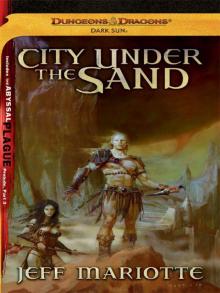 City Under the Sand
City Under the Sand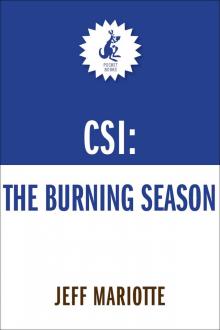 The Burning Season
The Burning Season Sanctuary
Sanctuary Winds of the Wild Sea
Winds of the Wild Sea Serpents in the Garden
Serpents in the Garden Close to the Ground
Close to the Ground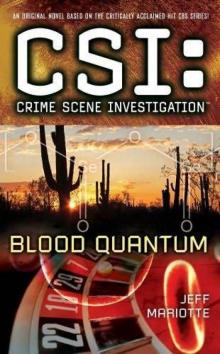 Blood Quantum
Blood Quantum Brass in Pocket
Brass in Pocket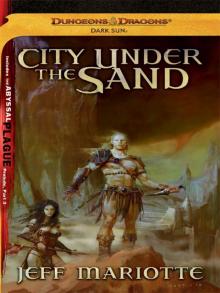 City Under the Sand: A Dark Sun Novel (Dungeons & Dragons: Dark Sun)
City Under the Sand: A Dark Sun Novel (Dungeons & Dragons: Dark Sun)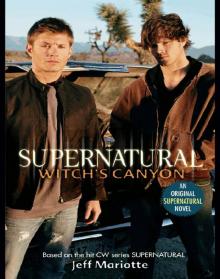 Witch's Canyon
Witch's Canyon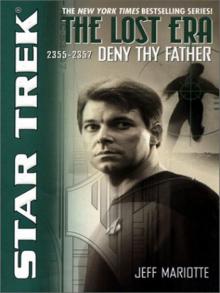 STAR TREK: The Lost Era - 2355-2357 - Deny Thy Father
STAR TREK: The Lost Era - 2355-2357 - Deny Thy Father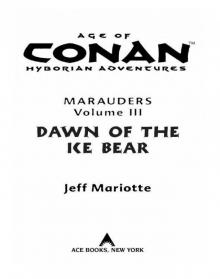 Dawn of the Ice Bear
Dawn of the Ice Bear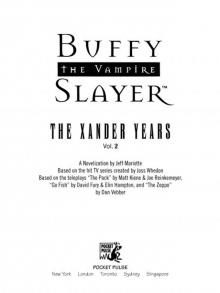 The Xander Years, Vol.2
The Xander Years, Vol.2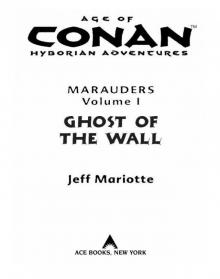 Ghost of the Wall
Ghost of the Wall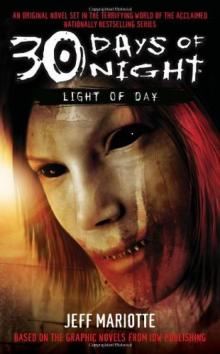 30 Days of Night: Light of Day
30 Days of Night: Light of Day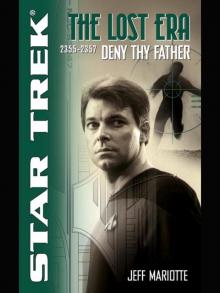 Deny Thy Father
Deny Thy Father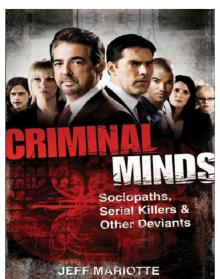 Criminal Minds
Criminal Minds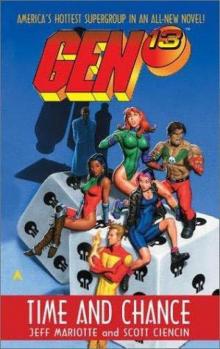 Time and Chance
Time and Chance The Folded World
The Folded World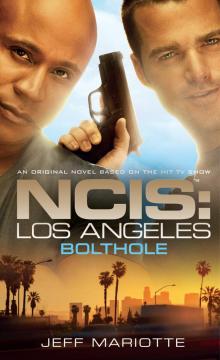 Bolthole
Bolthole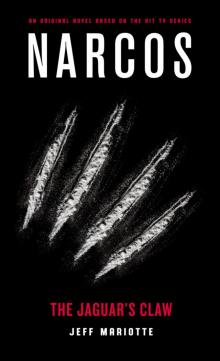 Narcos
Narcos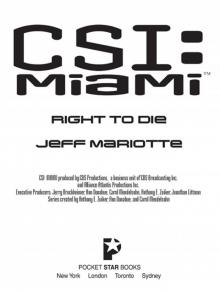 Right to Die
Right to Die